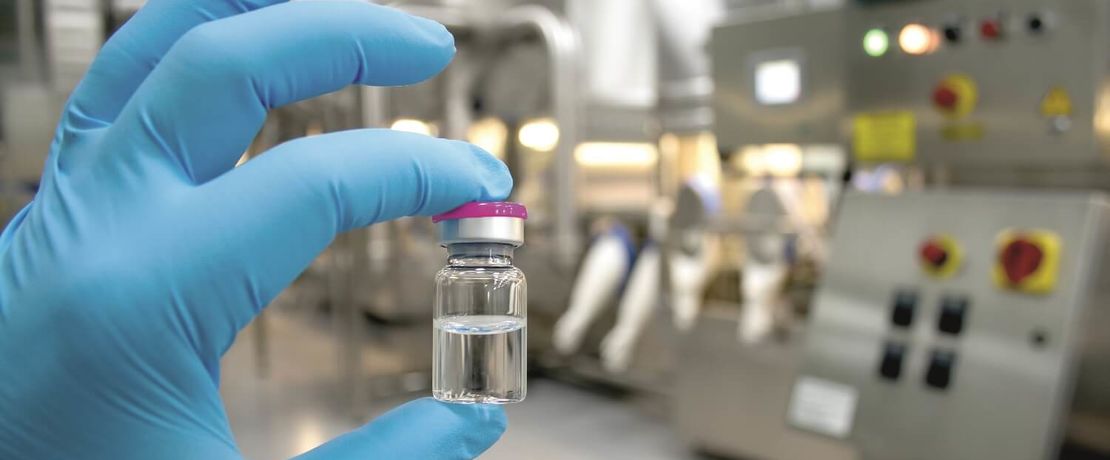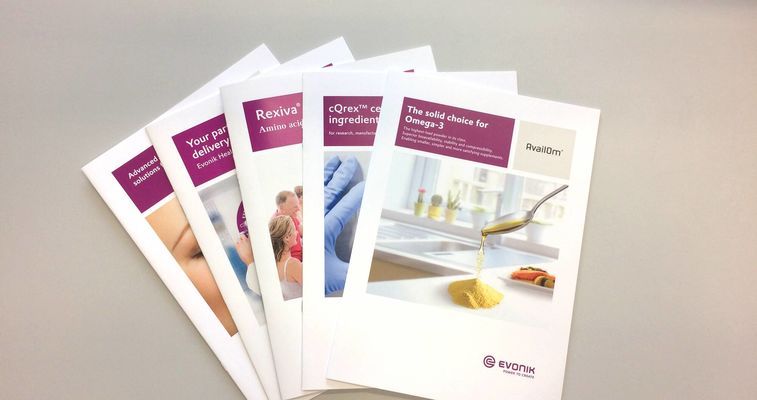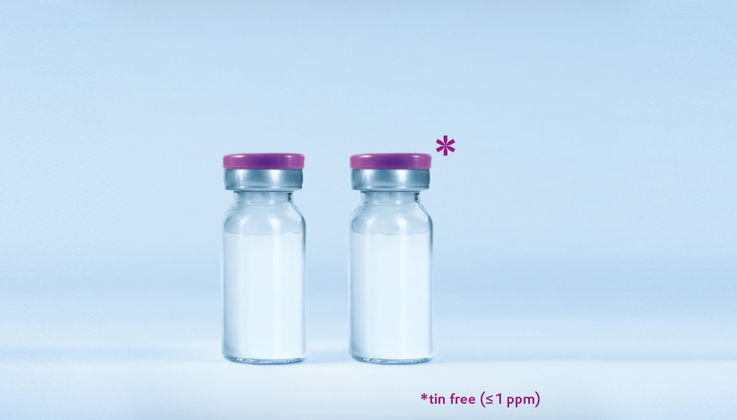
Biodegradable polymers for parenteral controlled release
RESOMER® and LACTEL® for safety, quality and supply security
Evonik’s RESOMER® and LACTEL® standard polymers represent the industry’s broadest and most versatile portfolio for controlled release applications. Both brands have strong records for safety and timely delivery of complex parenteral drug products. An extensive range of bioresorbable polymers are stocked and available for rapid shipment around the world to meet your lab, clinical and commercial requirements. Regardless of your polymer choice, Evonik can leverage decades of experience to ensure the polymer design, particle morphology and specification attributes match your specific release profile and other product specification requirements.
RESOMER® standard catalog of high-quality biodegradable polymers
The standard RESOMER® catalog of biodegradable polymers for controlled release includes high and low molecular weight homo-polymers, co-polymers and block co-polymers. Standard compositions include Poly (D,L-lactide) and Poly (D,L-lactide-co-glycolide) polymers with acid and ester end group chemistries. The RESOMER® portfolio also includes specialized co-polymers manufactured via polycondensation and di-block co-polymers made of PLA and mPEG. A variety of molecular weights are available to help modulate degradation times from weeks to years.
All polymers are purified as part of the standard manufacturing process to achieve low residual monomer content and avoid possible interaction of any remaining monomer with an API. RESOMER® polymers are typically produced in conformance with the Joint IPEC- PQG Good Manufacturing Practice Guide for Bulk Pharmaceutical Excipients 2017 and USP-NF General Chapter GMPs for Bulk Pharmaceutical Excipients via validated manufacturing processes in large batch sizes from production sites in Germany or the U.S.

Looking for information compiled in one document? Our brochures offer an overview of relevant details in just a few pages.
Controlled release of microparticles, in-situ depot formulations and drug-loaded implants with RESOMER® R and RESOMER® RG
RESOMER® R is a platform of PLA / poly (D,L-lactide)-based biodegradable polymers for controlled release. Designed, in particular, for microparticles and drug-loaded implants, these amorphous polymers are available with either acid or ester end groups. Degradation times can vary from as little as a few weeks or less to nine months or more. Inherent Viscosities (IV) can range from 0.15 to 0.75 dL / g, with molecular weights between 10,000 and 28,000 Daltons. Polymer properties including crystallinity can be easily tuned to match specific formulation and release profile requirements.
Poly(D,L-lactide) RESOMER® R standard polymers
|
Polymer
name |
Inherent viscosity
(dl/g) |
Composition
|
Degradation timeframe* |
End
group |
|
RESOMER® |
0.16 - 0.24
|
Poly(D,L-lactide)
|
< 6 months
|
Acid
|
|
RESOMER®
R 203 H |
0.25 - 0.35
|
Poly(D,L-lactide)
|
< 6 months
|
Acid
|
|
RESOMER®
R 202 S |
0.16 - 0.24
|
Poly(D,L-lactide)
|
< 9 months |
Ester
|
|
RESOMER®
R 203 S |
0.25 - 0.35
|
Poly(D,L-lactide)
|
< 12 months |
Ester
|
|
RESOMER®
R 205 S |
0.55 - 0.75
|
Poly(D,L-lactide)
|
< 18 months |
Ester
|
*Approximate degradation times are intended to guide polymer selection. Actual resorption times are dependent upon the process and application and must be empirically determined.
RESOMER® RG is a platform of PLGA / poly (D,L-lactide-co-glycolide)-based bioresorbable excipients for controlled release. Designed for use with a range of complex parenteral drug products, these amorphous polymers are also available with either acid or ester end groups. Standard mole ratios include 50:50, 65:35, 75:25 and 85:15. Degradation times can extend for up to 18 months or more. Inherent Viscosities (IV) can range from 0.09 to 1.7 dL / g, with molecular weights between 7,000 and 240,000 Daltons. Polymer properties including crystallinity can be easily tuned to match specific formulation and release profile requirements.
Poly(D,L-lactide-co-glycolide) RESOMER® RG standard polymers
|
Polymer
name |
Inherent viscosity
(dl/g) |
Composition
|
Degradation |
End
group |
|
RESOMER® |
0.08 - 0.16
|
Poly(D,L-lactide-co-glycolide) 50:50 |
< 3 months
|
Acid
|
|
RESOMER® |
0.16 - 0.24
|
Poly(D,L-lactide-co-glycolide) 50:50
|
< 3 months
|
Ester
|
|
RESOMER® |
0.16 - 0.24
|
Poly(D,L-lactide-co-glycolide) 50:50
|
< 3 months
|
Acid
|
|
RESOMER® |
0.32 - 0.44
|
Poly(D,L-lactide-co-glycolide) 50:50
|
< 3 months
|
Ester
|
|
RESOMER® |
0.32 - 0.44
|
Poly(D,L-lactide-co-glycolide) 50:50
|
< 3 months
|
Acid
|
|
RESOMER® |
0.45 - 0.60
|
Poly(D,L-lactide-co-glycolide) 50:50
|
< 3 months
|
Ester
|
|
RESOMER®
RG 504 H |
0.45 - 0.60
|
Poly(D,L-lactide-co-glycolide) 50:50
|
< 3 months
|
Acid
|
|
RESOMER®
RG 505 |
0.61 - 0.74
|
Poly(D,L-lactide-co-glycolide) 50:50
|
< 3 months
|
Ester
|
|
RESOMER®
RG 653 H |
0.32 - 0.44
|
Poly(D,L-lactide-co-glycolide) 65:35
|
< 3 months
|
Acid
|
|
RESOMER®
RG 750 S |
0.8 - 1.2
|
Poly(D,L-lactide-co-glycolide) 75:25
|
< 6 months
|
Ester
|
|
RESOMER®
RG 752 H |
0.14 - 0.22
|
Poly(D,L-lactide-co-glycolide) 75:25
|
< 6 months
|
Acid
|
|
RESOMER®
RG 752 S |
0.16 - 0.24
|
Poly(D,L-lactide-co-glycolide) 75:25
|
< 6 months
|
Ester
|
|
RESOMER®
RG 753 H |
0.32 - 0.44
|
Poly(D,L-lactide-co-glycolide) 75:25
|
< 6 months
|
Acid
|
|
RESOMER®
RG 753 S |
0.32 - 0.44
|
Poly(D,L-lactide-co-glycolide) 75:25
|
< 6 months
|
Ester
|
|
RESOMER®
RG 755 S |
0.50 - 0.70
|
Poly(D,L-lactide-co-glycolide) 75:25
|
< 6 months
|
Ester
|
|
RESOMER®
RG 756 S |
0.71 - 1.0
|
Poly(D,L-lactide-co-glycolide) 75:25
|
< 6 months
|
Ester
|
|
RESOMER®
RG 757 S |
0.9 - 1.3
|
Poly(D,L-lactide-co-glycolide) 75:25
|
< 6 months
|
Ester
|
|
RESOMER®
RG 858 S |
1.3 - 1.7
|
Poly(D,L-lactide-co-glycolide) 85:15
|
< 9 months
|
Ester
|
*Approximate degradation times are intended to guide polymer selection. Actual resorption times are dependent upon the process and application and must be empirically determined.
TIN-FREE RESOMER® CONDENSATES
The synthesis of RESOMER® grades of Poly (D,L-lactide-co-clycolide) or PLGA via direct polycondensation eliminates any requirement for the use of tin as a catalyst. Two RESOMER® Condensate PLGA polymers with a 50:50 mole ratio are available as standard products without any tin content. Both are low molecular weight polymers with an Mn of 800 and 2,300 Daltons. Additional molecular weight ranges are possible via the RESOMER® Select platform for customization.
Poly(D,L-lactide-co-glycolide) RESOMER® Condensate standard polymers
|
Polymer name
|
Molecular weight
|
Composition
|
|
RESOMER® Condensate RG 50:50 Mn 800
|
700 - 900 g/mole
|
Poly(D,L-lactide-co-glycolide) 50:50
|
|
RESOMER® Condensate RG 50:50 Mn 2300
|
2000 - 2500 g/mole
|
Poly(D,L-lactide-co-glycolide) 50:50
|
RESOMER® RP d catalog of PLA-PEG block copolymers
The RESOMER® RP d catalog includes di-block copolymers of poly(DL-lactide) and poly(ethylene glycol) incorporating various weight fractions of mPEG-5000. These amphiphilic polymers are available to help achieve shorter degradation times than standard lactide/glycolide-containing polymers and are especially suited for nanoparticle formation.
POLY(DL-LACTIDE)-CO-POLY(ETHYLENE GLYCOL) RESOMER® RP d STANDARD PRODUCTS
|
Polymer name |
Inherent viscosity |
Composition |
PEG |
Degradation timeframe |
|
RESOMER® RP d 155 |
0.55 – 0.68 |
Poly(DL-lactide)-block-poly(ethylene glycol) methyl ether 5000, 15 wt.% PEG |
15 |
< 2 months |
|
RESOMER® RP d 255 |
0.39 – 0.49 |
Poly(DL-lactide)-block-poly(ethylene glycol) methyl ether 5000, 25 wt.% PEG |
25 |
< 2 months |
|
RESOMER® RP d 335 |
0.33 – 0.42 |
DL-lactide)-block-poly(ethylene glycol) methyl ether 5000, 33 wt.% PEG |
33 |
< 2 months |
LACTEL® broad standard catalog of bioresorbable polymers for price sensitive applications
The standard LACTEL® portfolio boasts of more than 20 polymers available as a cost effective supply due to streamlined manufacturing processes. Common application areas for LACTEL standard polymers include veterinary medicine, where bioresorbable polymers are used in long-acting injectable formulations, and generic drug formulations, which require price-sensitive planning and quick shipment to support demanding, fast-paced markets. These non-solvent purified polymers are appropriate for many formulation applications, from existing generic products to novel therapeutics. For development projects, LACTEL® is available in small volumes that can then be scaled and optimized as a project progresses from small-scale research to full-scale commercial batches.
LACTEL® standard products
|
Product no. |
Polymer name |
Abbrev |
Inherent viscosity (IV) dL/g |
End group |
Degradation time*** |
|
B6017-1 |
50:50 Poly(DL-lactide-co-glycolide) |
50:50 DL-PLG |
0.15 - 0.25* |
Ester |
< 3 months |
|
B6010-1 |
50:50 Poly(DL-lactide-co-glycolide) |
50:50 DL-PLG |
0.26 - 0.54* |
Ester |
< 3 months |
|
B6010-2 |
50:50 Poly(DL-lactide-co-glycolide) |
50:50 DL-PLG |
0.55 - 0.75* |
Ester |
< 3 months |
|
B6010-3 |
50:50 Poly(DL-lactide-co-glycolide) |
50:50 DL-PLG |
0.76 - 0.94* |
Ester |
< 3 months |
|
B6010-4 |
50:50 Poly(DL-lactide-co-glycolide) |
50:50 DL-PLG |
0.95 - 1.20* |
Ester |
< 6 months |
|
B6001-1 |
65:35 Poly(DL-lactide-co-glycolide) |
65:35 DL-PLG |
0.55 - 0.75* |
Ester |
< 4 months |
|
B6001-2 |
65:35 Poly(DL-lactide-co-glycolide) |
65:35 DL-PLG |
0.83 - 0.93* |
Ester |
< 4 months |
|
B6007-1 |
75:25 Poly(DL-lactide-co-glycolide) |
75:25 DL-PLG |
0.55 - 0.75** |
Ester |
< 6 months |
|
B6007-2 |
75:25 Poly(DL-lactide-co-glycolide) |
75:25 DL-PLG |
0.80 - 1.20** |
Ester |
< 6 months |
|
B6006-1 |
85:15 Poly(DL-lactide-co-glycolide) |
85:15 DL-PLG |
0.55 - 0.75** |
Ester |
< 9 months |
|
B6006-2 |
85:15 Poly(DL-lactide-co-glycolide) |
85:15 DL-PLG |
0.76 - 0.85** |
Ester |
< 12 months |
|
B6005-1 |
Poly(DL-lactide) |
DL-PL |
0.26 - 0.54** |
Ester |
< 12 months |
|
B6005-2 |
Poly(DL-lactide) |
DL-PL |
0.55 - 0.75** |
Ester |
< 18 months |
|
B6013-1 |
50:50 Poly(DL-lactide-co-glycolide) |
50:50 DL-PLG |
0.15 - 0.25* |
Acid |
< 3 months |
|
B6013-2 |
50:50 Poly(DL-lactide-co-glycolide) |
50:50 DL-PLG |
0.55 - 0.75* |
Acid |
< 3 months |
|
B6012-4 |
75:25 Poly(DL-lactide-co-glycolide) |
75:25 DL-PLG |
0.70 - 0.90** |
Acid |
< 6 months |
|
B6014-1 |
Poly(DL-lactide) |
DL-PL |
0.16 - 0.25** |
Acid |
< 6 months |
*value measured in HFIP
**value measured in chloroform
***Approximate degradation times are intended to guide polymer selection. Actual resorption times are dependent upon the process and application and must be empirically determined.
Glucose star polymer for highly sensitive or reactive APIs
The Glucose Star Polymer is a branched 55:45 DL-PLG that is highly purified to achieve nearly undetectable levels of residuals including tin and monomer. Developed specifically for the formulation of microspheres with octreotide, its branched nature provides unique drug delivery characteristics and may be beneficial for use in applications involving highly sensitive or reactive APIs.
Glucose star polymer
|
Product no. |
Polymer name |
Abbrev |
Inherent viscosity (IV) dL/g |
End group |
|
B6131-1 |
55:45 Poly(DL-lactide-co-glycolide), Glucose initiated |
55:45 DL-PLG-Glu |
0.40 - 0.60** |
Hydroxyl |
**value measured in chloroform

Evonik offers various samples of polymers from the RESOMER® and LACTEL® portfolio for new commercial development projects. These allow you to test the properties, performance, safety, and quality of our biodegradable polymers.
Discover for yourself how RESOMER® and LACTEL® polymers can support controlled release and help strength the safety and timely delivery of complex parental drug products.
All pharmaceutical grade polymer production is conducted in accordance with the International Pharmaceutical Excipients Council (IPEC) Good Manufacturing Practices guidance for Bulk Pharmaceutical Excipients, which are recognized and published in the United States Pharmacopeia. Polymers are produced in ISO 8 clean rooms with controlled temperature and humidity in our modern, well-equipped production and laboratory facilities in Birmingham, Alabama, U.S. Both Drug and Device Master Files are maintained with the FDA.
Want to receive more information about our polymers?
Our web portal onCare is the central platform for customers and prospects of Evonik's Health Care business line. It provides you with useful tools and resources around our products and services – available anytime and anywhere. To learn more about onCare please see the below article or directly visit oncare.evonik.com to create your free acount and explore the various tools and functionalities.

Our customer portal
Visit our onCare platform to access a variety of features and content going beyond what you find on our website. ... MORE





